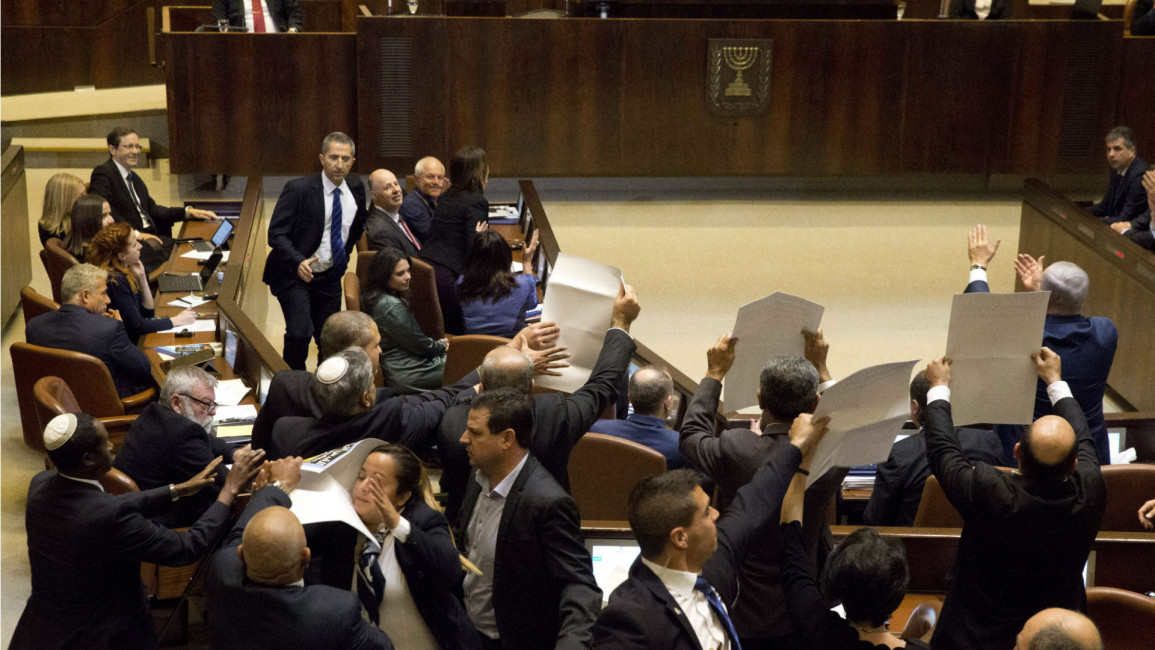Israel cracks down on online use of the word 'martyr' by Palestinian citizens
Israel's public prosecution ordered criminal investigations into Palestinian citizens of Israel who post social media comments which include the Arabic word "shaheed" ("martyr"), Quranic verses, or "prayers to God", reported Israeli daily Yedioth Ahronoth on Tuesday.
A document detailing the banned words and phrases was disclosed after secret discussions held by the Knesset's Constitution, Law, and Justice Committee when the head of the committee, Simcha Rotman, claimed that the public prosecution had been too lenient around prosecuting suspected "instigators" since the start of Israel's war on Gaza. This included those who quoted Quranic verses on social media.
According to the guidelines outlined in the prosecution's document, the use of the word "shaheed" to describe "a person killed during or after carrying out a terrorist act may be viewed as support, praise and backing for the terrorist act, through an examination of the circumstances".
The term "shaheed" is blanketly used in the Palestinian context to refer to all those killed - both civilians and fighters - by Israel, including during the war on Gaza.
The crackdown on language used by Palestinian citizens of Israel contrasts with incitement by high-ranking Israeli officials.
Palestinians in Israel have been singled out by police for social media posts by the police, universities, and workplaces since the current war started.
A letter from prominent Israelis to Israel's judiciary in December pointed out the contrast between the lack of action on even "the gravest and most dangerous instances of incitement against residents of Gaza" with the intense campaign against incitement "whose potential victims are Israeli Jews".
Simcha Rotman, who alleged the public prosecution had been too lenient regarding social media posts by Arab citizens, hails from the far-right Religious Zionism Party and was a leading figure pushing Israel's controversial judicial overhaul measures in 2023 which led to mass protests.
Following Rotman's claim, Deputy State Prosecutor Alon Altman revealed there was in fact alignment when it came to the policy being pursued by the public prosecution and the police, although this policy had been concealed.
The guidelines added that an investigation wouldn't be opened for "incitement" if the circumstances surrounding the death of the person being described as a martyr are unclear and their involvement in a "terrorist act" isn't obvious.
The document stated that in posts containing "prayers to God," the context, including timing and content, would dictate whether a criminal violation might have transpired and whether an investigation should ensue.
According to the instructions, a "supplication to God", which is linked to a person or event connected to a "terrorist act" would be grounds for opening an investigation which could lead to trial in certain cases.
"These instructions do not criminalize passages from prayers or religious texts in and of themselves in the absence of context, an image or something else which raises suspicion," the newspaper quoted Altman as saying.
This article is based on an article which appeared in Arab48 by Bilal Daher on 16 April 2024. To read the original article click here.
Translated by Rose Chacko


![Minnesota Tim Walz is working to court Muslim voters. [Getty]](/sites/default/files/styles/image_684x385/public/2169747529.jpeg?h=a5f2f23a&itok=b63Wif2V)




![An Israeli air strike on Jabalia killed teenage journalist Hassan Hamad [Screengrab/X]](/sites/default/files/styles/image_212x120/public/2024-10/hassan%20hamad1.jpg?h=c12e0b96&itok=KstD_5xk)

![Israeli strikes on Beirut [Getty]](/sites/default/files/styles/image_330x185/public/2176155077.jpeg?h=a5f2f23a&itok=Xq7ypWgM)